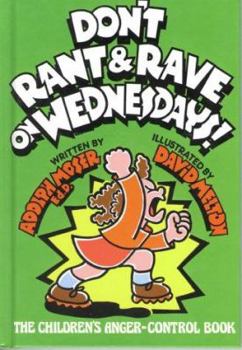Don't Rant & Rave on Wednesdays!: The Children's Anger-Control Book
Select Format
Select Condition 
Book Overview
The Emotional Impact Series... Anger can be a powerful and frightening emotion for children to see in others and experience in themselves. In this book, Dr. Moser explains the causes of anger and... This description may be from another edition of this product.
Format:Hardcover
Language:English
ISBN:0933849540
ISBN13:9780933849549
Release Date:January 1994
Publisher:Landmark Editions
Length:61 Pages
Weight:0.65 lbs.
Dimensions:0.5" x 6.3" x 9.1"
Age Range:9 to 12 years
Grade Range:Grades 4 to 7
Customer Reviews
5 ratings
Don't Rant and Rave
Published by Thriftbooks.com User , 21 years ago
I'm a therapist in private practice. I send this book home with elementary school age children and they love it so much that they don't want to bring it back! They are relieved to know that they are not the only ones who get angry. The book gives them great tips on how to calm down. Moser knows children and has a sense of humor. Enjoyable pictures.
Good One...
Published by Thriftbooks.com User , 21 years ago
I'm a school counselor and use this one with my middle elementary aged kids (3-4 grade). They enjoy it and it's easier for them to understand. I really recommend this one.
Don't get mad, get busy
Published by Thriftbooks.com User , 22 years ago
This 61-page picture book contains simple language easily read by first and second graders (on a par with Dr. Suess), but its sophistication about children's anger will keep them coming back until they are approaching middle school. The premise is simple: Everyone gets angry--young people, old people, tall people, short people, fat people, thin people, nice people, mean people, men people, women people, boy and girl people. Including, of course, kids reading this book. When people get angry they do silly things--shake their fists, jump up and down, rant and rave, call bad names, throw things. The book explains anger as the feeling we have when we are really annoyed or really mad. Anger, children learn here, affects their thinking, excites emotions, makes muscles tense. Kids learn why people get angry (it happens more easily when they don't fell well, or are in a grumpy mood, when someone calls a bad name, makes fun, pushes, hits or breaks a favorite toy). People can get mad at themselves, too--because they stub a toe, bump their head, dent their new bike, lose their lunch money or forget their homework. It also happens often--up to 12 times a day. When people are angry, they do funny things. If someone laughs at them, they get angrier, lose control, hit and sometimes become so enraged, they even kill another person. Being so angry can actually make people sick. About halfway through this book, the author notes that in order to become productive and happy, kids should avoid being angry. This section begins with the recognition that anger is often inappropriate. No one would consider it funny, for example, for the President of the U.S. to get so angry that he started screaming and yelling on national television. Feeling angry can be harmful. People who rant and rave get into more fights, are more apt to lie, cheat and steal, drop out of school and get sick or use drugs.It's not good, either, to blame oneself for others' anger. They are responsible for themselves. We are responsible for ourselves. And we can quickly change from feeling okay to feeling angry, which in turn produces physical reactions, including tense muscles. It's like "speeding down the highway at one hundred miles per hour" in a car without a steering wheel. The book's final 18 pages provide anger-control methods. "Before you race out of control," Moser writes, "put on the brakes. Give yourself time to calm down by counting to ten slowly. If you still feel upset, keep on counting." Staying calm, the book tells kids, will help them to think more clearly, listen to their thoughts and control their behavior. Reading a joke book can kids laugh, which creates good brain chemicals, which in turn kill pain. The author also advises kids to channel their anger to good uses: draw a picture, write something, clean a room, wash dishes, straighten a closet, take a walk or a hot bath. These exercises can reduce anger. (But hitting a punching bag, playing football or other violent activities won'
Fantastic Tool
Published by Thriftbooks.com User , 23 years ago
This book is very helpful on discussing anger management w/ children. I have a son that has ADHD and this is a great tool to use. I would recommend this book for elemetary children, 5 and up.
A great book to help kids control thier anger.
Published by Thriftbooks.com User , 24 years ago
I think this is a very good book. I'm teaching my kids not to get mad so many times. I tried everything, I read this book to my kids and now they are much better controling thier anger.




